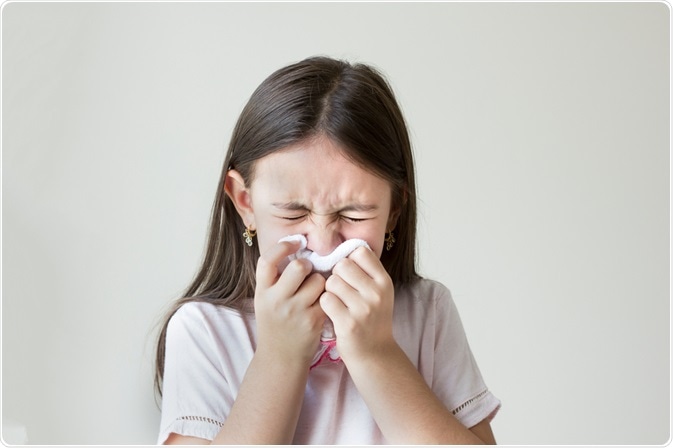Allergic conditions are very common in modern society. In fact, it is estimated that up to half of all children in the United Kingdom have been diagnosed with at least one form of an allergic condition such as asthma, atopic eczema, hay fever, or food allergies. With this increase in the prevalence of allergies, the development of these conditions is coming into question to help in the prevention and management.

Image Credit: Marcelo Ricardo Daros / Shutterstock.com
Allergic conditions
There are several allergic conditions that are often grouped together when discussing the link between allergies and genetics, including asthma, atopic eczema, hay fever, or food allergies. These conditions appear to be linked and follow a similar pattern in terms of an individual's genetic susceptibility.
Children affected by allergies often follow a pattern where they will progress through a series of allergic conditions, known as the allergic march. For example, children may initially experience atopic eczema with then subsides, followed by the presentation of asthma and then rhinitis. Some children will also develop several allergic conditions and retain them for life.
Familial link
Some families appear to be more likely to be affected by allergic conditions than others. Therefore, children born into these families often have a higher risk of developing an allergic condition. This familial tendency to develop allergic conditions is thought to have a genetic link known as atopic.
It is estimated that more than half of children born into atopic families will develop an allergic disease, whereas the incidence of children with no family history of allergic disease is one in five. The risk is elevated even further for families where both parents are affected by an allergic condition.
Notably, children do not always develop the same allergic condition as the other members of the family. Research tends to indicate a genetic susceptibility to allergies in general, rather than a specific allergic condition.
Genetic research
Genome-wide association studies (GWAS) have helped to enlighten the current understanding of genes in the development of allergic conditions.
Specific gene variations that alter the encoding of epithelial cell-derived cytokines such as interleukin-33 and thymic stromal lymphopoietin may be involved in the pathogenesis of allergies. Additionally, variations in the ORMDL3 and GSDML genes have been linked to an increased risk of early-onset asthma.
These findings help to identify children with the highest susceptibility to allergies, which can be useful in targeting preventative techniques or being aware of allergies symptoms that require treatment.
However, there remains much to be discovered in the research field of allergies and genetics. Further studies are required to continue broadening the understanding of the genetic development mechanisms of allergic conditions and begin to implement techniques to lessen the impact of allergies on the modern population.
Other factors
Not all children born into atopic families will develop allergies, and some children with no family history of allergies will develop an allergic condition. Therefore, genetics cannot be the only cause of allergies and there are likely to be other factors involved in the development of allergies conditions.
Other factors that have been linked to allergies include the surrounding environment and lifestyle habits including:
- Exposure to smoke
- Exposure to farm animals and products
- Domestic cats and dogs
- Daycare attendance
- Viral infections
- Vaccinations
- Medications
- Air pollution
- Diet
It is likely that each of these factors may play in the pathogenesis of allergies, particularly for individuals who have a genetic susceptibility to the condition.
References
Further Reading
 New method may help identify the essential ingredients for making an effective HIV vaccine
New method may help identify the essential ingredients for making an effective HIV vaccine